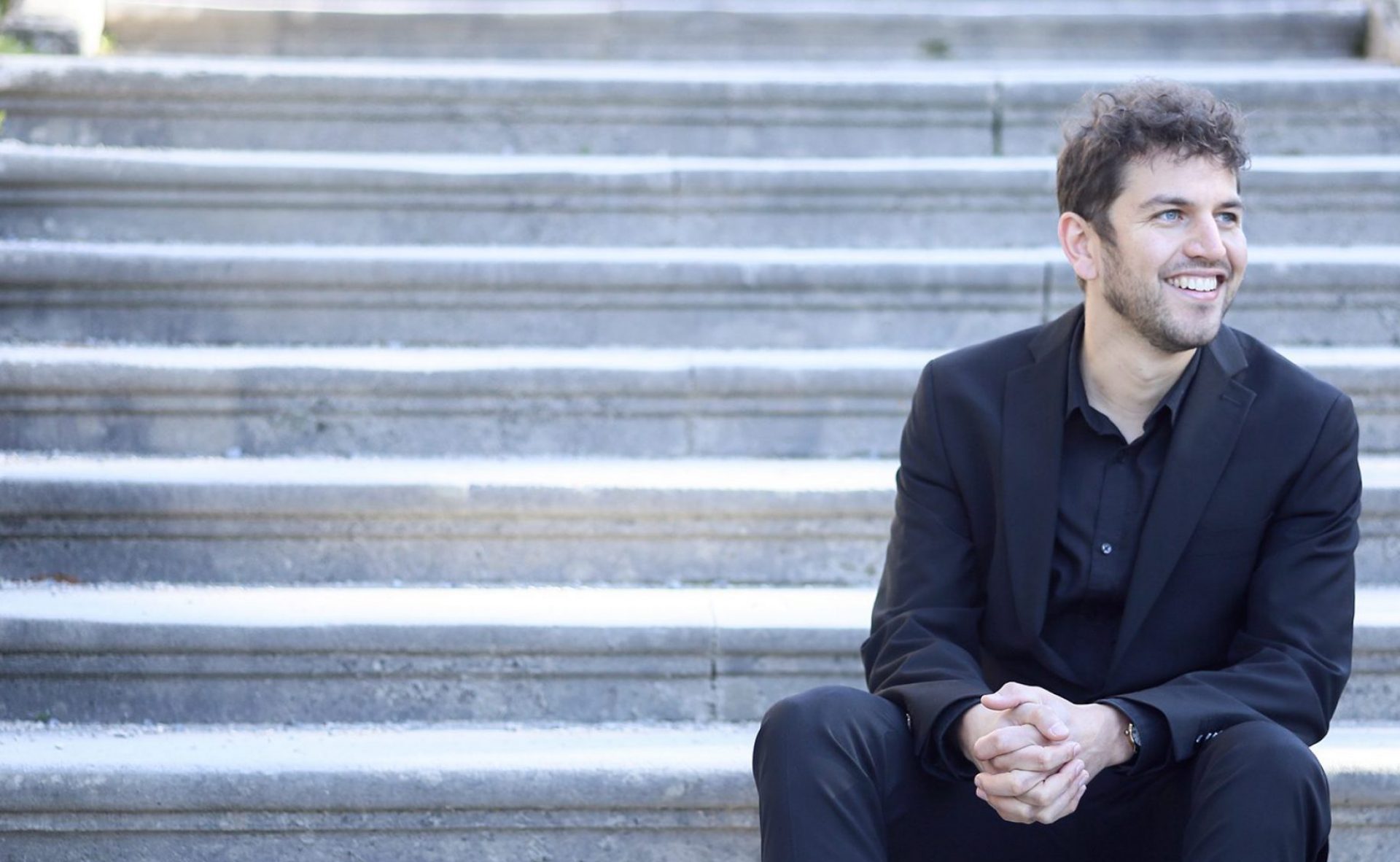Sonja Bühling is a German mezzo-soprano who currently sings as an alto in the chorus of the Staatstheater Darmstadt, Germany. Born in Rosenheim, she completed her studies with distinction at the Mozarteum in Salzburg with Elisabeth Wilke and Helmut Deutsch She has sung a variety of solo roles and in 2018 recieved a scholarship from the Richard Wagner Society. She joined the chorus in Darmstadt in 2018.
This interview was done in German, and you can find the original language version of it here.
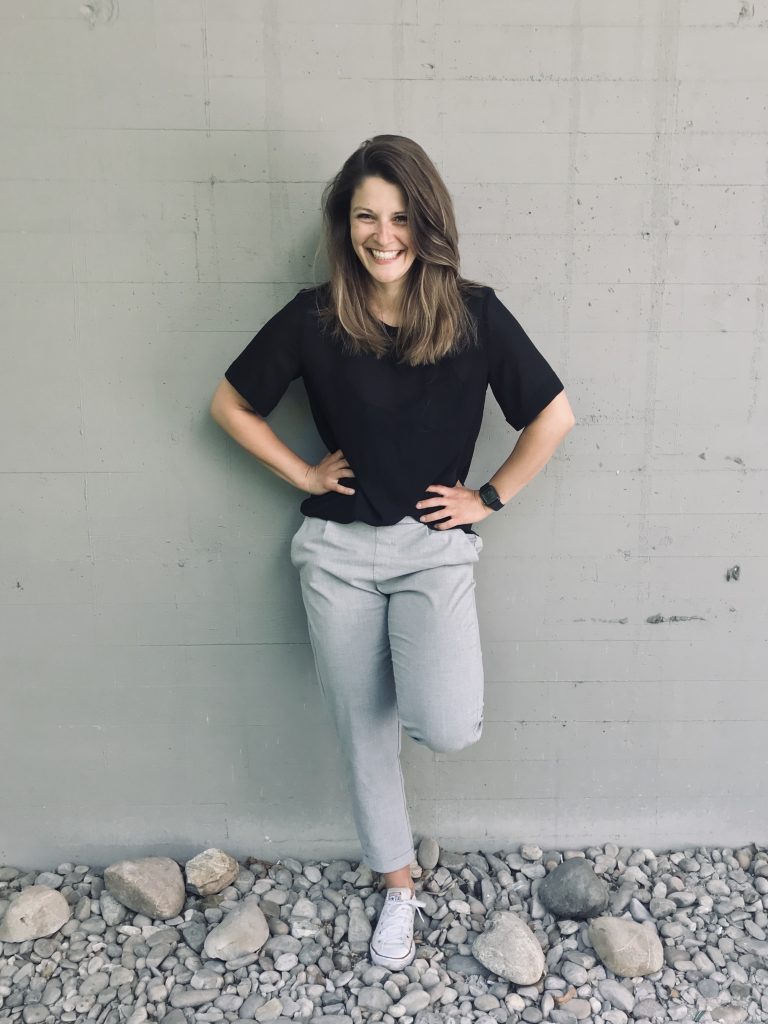
In the chorus you are part of a community. You make music together, you are together in the rehearsal room or on stage, and in the best case, everyone works together to achieve the best result. I find it very special to be part of such a collective.
D: We’ll begin with the traditional quick-fire round. What song would get you onto the dance floor?
S: All the Single Ladies!
D: What’s your favourite composer?
S: To listen to, I would say Massenet. The opera Manon has always fascinated me. It was the reason why I wanted to be a soprano. When it comes to singing, I’d say Mozart. I like the demands Mozart makes on a singer, even if this means his music is not always so easy to sing.
I also like the liveliness and comedy of Mozart’s operas, like Le Nozze di Figaro. But he also wrote good serious operas. I like the music in La Clemenza di Tito, for example, it’s really great. It’s like another version of Mozart, not typical Mozart.
D: Usually at this point I would ask you to describe your Hot Toddy, but since we’re in lockdown, please describe your current beverage in three words!
S: I have a tea that’s spicy, warm and tastes oriental.
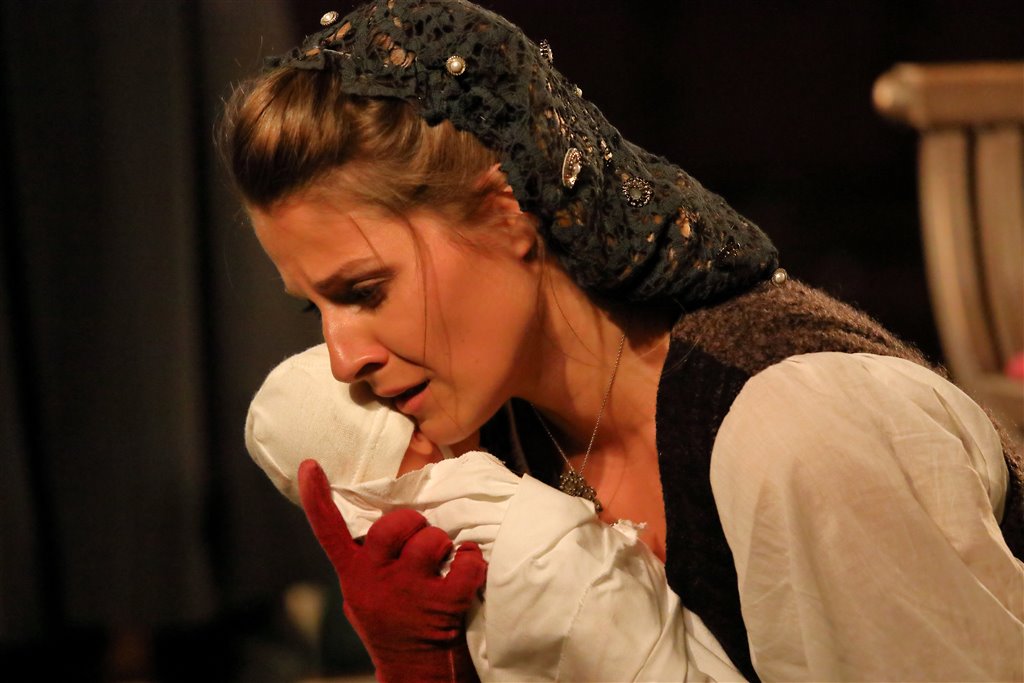
D: We know each other from working together at the Staatstheater in Darmstadt, where you sing alto in the chorus. What do you like the most about being in the chorus and why did you decide to be part of it?
S: To be honest, I always thought that I wanted to be a solo singer. I had sung in choirs before, but in the end I always saw myself as a soloist on stage. That changed when I realised that although it’s a wonderful thing to be a soloist, there is so much more to it. As a soloist you have to live with a lot of pressure; on the one hand the pressure of building your career, going from audition to audition and getting a lot of rejections, but also the pressure of having to always be fit and able to deliver.
To work successfully as a soloist is very difficult today, because the competition is extremely high and there are not as many theatres as there used to be, so you always have to be in top form. You also don’t have the time to develop as you used to. Today you are maybe 2-3 years at a theatre, then the next singer comes to take your place. In the past, singers worked much longer in a theatre where they were given time to develop.
All these things led to the fact that I had less and less fun and pleasure in making music. And that is completely counterproductive for singing. For me this pressure and mental strain was too much, so I decided to audition for chorus jobs. My dream was still to be a singer on a stage at the theatre.
To be honest, I didn’t know at that time whether chorus singing was really an option for me as a profession. There are a few prejudices about what chorus singers in professional choruses are supposed to be, like that they don’t have much motivation anymore, or that you are only ever perceived as a mass, so therefore artistically not much is demanded of the individual. I was afraid of that. But I did the auditions anyway and was accepted in Darmstadt, which I was very happy about, especially so when I realized that at least in Darmstadt, none of these things apply.
There are a lot of people in the chorus here, who are still very excited about going on stage and want to do a great job, and who are totally enthusiastic about the theatre life. I don’t know how it is in other choruses at other theatres, but I feel very fortunate that I landed in Darmstadt, and I noticed how much it freed me. I enjoy the work a lot and I also feel artistically challenged.
D: What else do you enjoy about being in the chorus?
I like the fact that in the chorus you are part of a community, though this is both an advantage and a disadvantage. You make music together, you are together in the rehearsal room or on stage, and in the best case, everyone works together to achieve the best result. I find it very special to be part of such a collective.
It’s also a kind of energy that is created in the community – there’s a big difference when you rehearse choral music alone. In the chorus everything happens together, and that can be great. The disadvantage or danger is that you are perceived as a group and less as an individual. Therefore, as in any group, you are only as strong as its weakest member. This means that if you are always very prepared, listen and follow the director’s instructions, there may still be someone who is not so diligent, and this usually reflects on the whole group. You have to try to distance yourself from that.
D: Have you had opportunities to sing solo roles since you’ve been a member of the chorus?
S: Yes, fortunately that is an option that comes up sometimes. There was an audition for solo roles right on the third day after I began in Darmstadt, but I didn’t take part then. I wanted to establish myself in the chorus first. Then in June, at the end of the season, I received an e-mail asking me whether I would like to take on the role of Venus in the operetta Frau Luna. That was great and I was incredibly happy about it! It’s only a very small role – maybe three lines solo and the rest ensemble – but I really enjoy doing it.
D: In the chorus your repertoire has to be very broad. You sing everything from Mozart to our current project Requiem für ein jungen Dichter by modernist composer Bernd Alois Zimmermann. Is there a style of music that you find more difficult?
S: I found the Zimmermann difficult, or modern music in general. I must say that even though I have sung modern music and some of it was great, it always takes me a long time to learn it and time until I like it. In the beginning I often find it just exhausting. You have to try to make a connection, then you get used to it or even enjoy it. But that sometimes takes time.
In general I like to sing romantic music where it just flows and you can concentrate more on the feelings. What totally surprised me this season is that the music of [Wagner’s] Lohengrin really touched me. I always thought that Wagner was not for me, but during rehearsals I became more and more attached to this music and it moved me a lot.
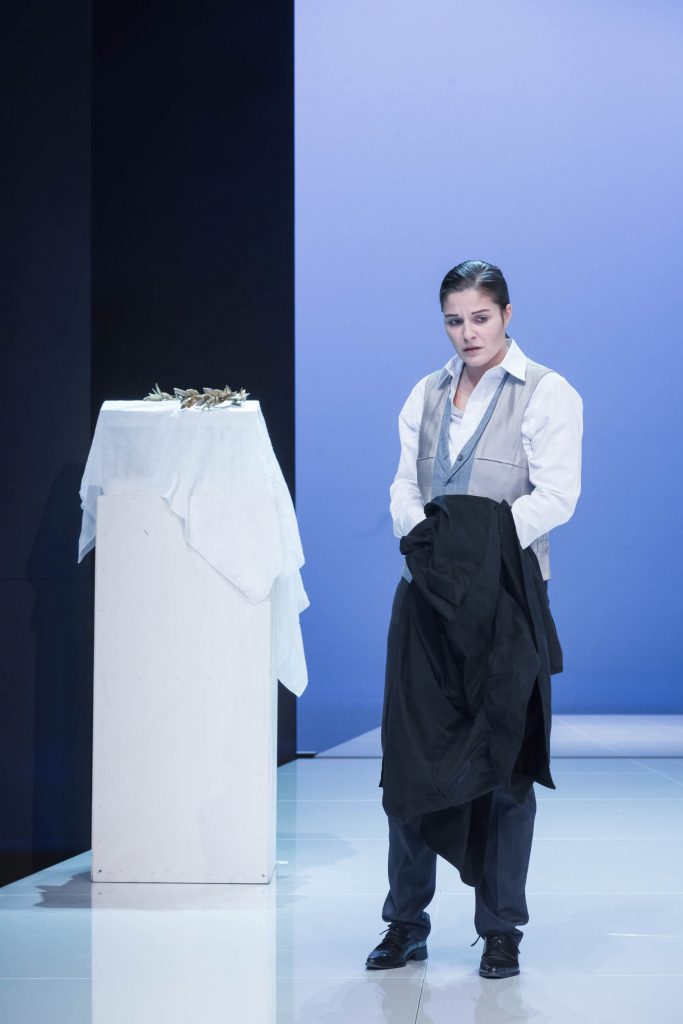
D: Do you sing in a different way when you sing in the chorus compared to when you’re singing a solo role?
S: Yes and no. I think singing in the chorus suits me well. It is a prejudice that singing in a chorus is very exhausting for the voice. I haven’t found that to be the case, though perhaps that’s true if you are in high register singing soprano all the time. Sometimes I even find it very relaxing for the voice, because you don’t always have to give full voice.
As a soloist I sometimes had the feeling that I had to give more voice so that I could be heard. This is of course a myth, because you don’t achieve this range by power, but by technique. Especially with Mozart’s mezzo roles, which lie a lot in the Passagio1, you can get very tired. I have found that I make music in a much more relaxed way through chorus work, and it gives me incredible pleasure.
An important technical thing to pay attention to in a chorus is not to have too much vibrato, because that would disturb the overall sound of the group. You shouldn’t be heard as a single voice either; it’s more about creating a homogeneous overall sound. You might have to adapt a bit.
D: How do you learn the music off by heart? Do you have a specific method?
We have so many rehearsals as a chorus that it’s possible to get to know the music off by heart during them. Sometimes there are difficult passages, because the melody repeats itself, but with small changes. In this case I go through the music again at home and try to remember a system, which is usually very mathematical.
For my solo roles I have sometimes learned the lyrics and the melody by heart, sometimes with recordings from the opera. In order to check whether I can do it well enough to be able to concentrate on acting during the rehearsals, I have often cleaned my apartment on the side. That way I could see what was already internalized and what was not, and my apartment was always very clean!
D: Is there a piece you particularly want to do while you are in Darmstadt?
S: I would love to do the operetta Im weißen Rößl. I think it would be lots of fun. I think it’s good to do something funny and light between the serious and the grand operas. That’s why I enjoyed Kiss Me Kate so much.
D: Do you have to be able to dance to sing in an opera chorus?
S: No, you don’t have to be able to. Sometimes there are smaller dance interludes, but they can be done by anyone. I would like that to happen more often, because I always enjoy choreographies or in general, when there is a lot of movement on stage. But that is not a prerequisite for an opera chorus. With musicals it is, but that is a completely different education.

We Germans are aware that our country is rich in culture and art, and we want it to stay that way. We have 16 federal states in Germany, and in 12 of them the state constitution stipulates that culture must be promoted and preserved.
D: Germany is a dream land for many musicians from all over the world, who come here to work in opera. Why is opera so strong here and how was it for you as a German, growing up here? As a child or teenager, was it normal to have an interest in opera?
I find this topic really interesting. Germany really is a wonderful place for culture. There are over 80 opera houses and about 132 orchestras in Germany. This broad cultural landscape is able to exist above all because it is financed by the state. In the USA, for example, where everything is privately financed, there are just 11 opera houses.
I think it is because we Germans are aware that our country is rich in culture and art, and we want it to stay that way. We have 16 federal states in Germany, and in 12 of them the state constitution stipulates that culture must be promoted and preserved. At present, this broad and varied cultural and orchestral landscape has even been nominated for a UNESCO World Cultural Award, which shows the importance of culture in Germany and also explains the high level of subsidies.
On average, a theatre makes between 16-18 % of its income through ticket sales. The rest are subsidies. The reason for these high subsidies is that culture should be accessible to everyone and therefore ticket prices must be affordable. Without the subsidies, the theatre would have to set the prices much higher and therefore not everyone could afford to go to the theatre.
Here in Darmstadt you pay between 15€ and a maximum of 60€ for a ticket. The state pays about 100€ per seat to make a visit to the theatre possible. Often there are also offers for students (in Darmstadt they get a free ticket) and pupils. The argument that theatre is too expensive is simply not true. Instead, I would say there are a lack of attractive offers for younger people, and to inform them.
The big problem is that the stage audience consists mainly of older people. The average age is about 57 years and so you have to wonder what the audience will look like in 20 – 30 years. It is therefore an important task to enthuse the younger generations for theatre and to inform them enough about it.
Of course, opera and classical music are a niche product, and not everyone has to go to the opera in the end. But what I do not like in general is that access is often not made possible. Especially at a younger age, children are very enthusiastic about music and theatre and you have to pick up where you left off and continue to cultivate this interest so that no inhibitions or prejudices can arise. I think it is a total pity when people close themselves to classical music and opera without having tried it. I find it sad that they will never get to know this wonderful world.
Opera didn’t play a major role in my childhood. We lived in a small village and the nearest opera house was about 70 km away. My parents also rarely went to the opera and hardly listened to classical music at home. I knew [Mozart’s] The Magic Flute from school, but otherwise I didn’t know much about classical music and opera.
However, I was encouraged musically at a very early age and was allowed to try out different instruments. In Kindergarten I already played the flute and later on I also learnt the piano and dulcimer. And then of course I had singing lessons. So the way was paved, but still I sometimes ask myself how I came to this profession, even though I am very happy about it!
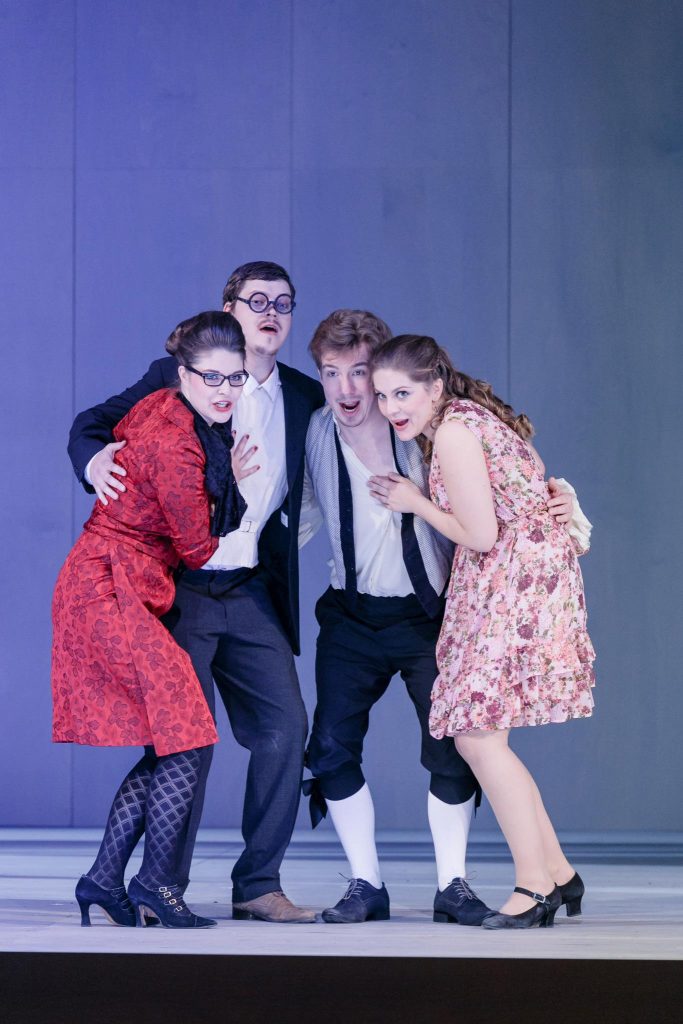
D: You studied at the Mozarteum in Salzburg. How was it to study and live in a city that was so well-known to Mozart?
It was great! Although the city is relatively small and at that time also rather conservative with unfortunately relatively few young people, it is so rich in culture and so incredibly beautiful. The Mozarteum also did many great projects, like when we went to Italy and performed La Clemenza di Tito in a large amphitheatre. In general, the opera productions were always very elaborate.
I actually studied Master Lied with Helmut Deutsch, which was great, but I was still able to take on roles in the opera class. In the summer we had the festival right on our doorstep. The city was pretty crowded, but there was always a really nice atmosphere.
It was great that you got the chance to participate in projects in the chorus or to get small solo roles. It was a very special atmosphere. After the rehearsals, we sat with some of the big star singers in a small restaurant called Triangel next to the festival halls and there was a totally relaxed atmosphere!
The Mozart connection in Salzburg could also be annoying. There is advertising for Mozart chocolate everywhere and sometimes you get the feeling that the whole city is just for Mozart tourists. There were always a lot of people in the city who came either for Mozart or for The Sound of Music. I did guided tours through the three festival halls for a while and often had the feeling that many people didn’t even know about the festival. They just wanted to see the Felsen Riding School, where a scene for The Sound of Music was shot.
D: Last summer you visited the Wagner Festival in Bayreuth. Can you tell me a bit about your time there?
S: Yes, for years now there has been a scheme organized by all of the Wagner associations in Germany, which every summer invite up to 250 scholarship holders from all over Europe (or even the world, I don’t know) for about a week to the Bayreuth Festival. The selection process is carried out by each association independently.
Sometimes you have to audition or send in recordings, or submit certificates, etc. If you are lucky enough to be selected, you can go to Bayreuth for about one week and see three performances. Accommodation is paid for and dinners are organised, as well as guided tours of the Festspielhaus, Bayreuth, the Wagner Museum etc.
There is quite a lot going on and it’s a great opportunity to visit the festival as a music student, since the tickets are usually incredibly expensive. I think it’s a great scheme, and I can recommend it very highly.
What we do is an exchange of energy, and even if the people in the audience are not musicians, they are able to feel and pick up this energy. When you have a conductor whose heart is burning for the music, it does something to me as a singer.
D: As a chorus singer, what do you need in a Chorus Master?
S: Above all, he or she must love their job. I think that’s important for everyone who works in art: that they have a passion for what they do and that you can feel it. I also want them to be fair and not show any preferences for certain people. Trust and respect are also important. And that they can stand up for the chorus if necessary.
D: As a chorus member, you tend to see the conductor much later in the preparation process. What do you need from them as a chorus singer?
S: With a conductor, you can always tell if he or she has a good grasp of voices and singing. I think it is important that conductors do not concentrate exclusively on the orchestra sound at the expense of the singers. Of course, the orchestra is always directly in front of the conductor, so it is important to find a good balance so that the singers can be heard.
Some conductors see their work with the orchestra as the most important thing and seem to forget the singers, which is a pity, because then the overall sound no longer works. And a conductor should have a clear and legible beat.
What I also like is when a conductor is so full of passion and energy that you get the feeling that they could die for their work. That’s so important because what we do is an exchange of energy, and even if the people in the audience are not musicians, they are able to feel and pick up this energy.
When you have a conductor whose heart is burning for the music, it does something to me as a singer. I would like to have more conductors with this energy and the willingness to be fully committed. Many conductors are correct and do everything “right”, but they do not carry the singers with them.
D: What do you need from a director?
S: First and foremost, they have to have a concept when the rehearsals begin. Our task in the chorus is to prepare the music well so that the stage rehearsals go smoothly, and I expect the same preparation from a director. In the best case they want to express something through the staging. That doesn’t mean that I have to like the concept, but it must be coherent.
I also think that you can dare to do something innovative if it is well thought out. I think that operas are sometimes regarded as too “sacred”, as if there is an unspoken law that must not be changed. I think that if composers and librettists were still here today, they would change a lot themselves.
Beethoven already tried in his time to change his own works and to make something new for people, but without much success. Even Picasso often painted the same work in different ways and in different styles. That is creativity! You take something, break it up, bend it and create something new. Something new never comes out of nowhere, it usually builds on something existing and is modified. Sometimes that changes things for the better and sometimes not. But I think that we can dare to do it much more often.
Our Fidelio production, for example, was done like this. Of course there were some who said that you shouldn’t do it like we did and that it would harm Beethoven. In the finale, some of Beethoven’s music was cut out and partly replaced by newly composed music. The whole thing was well thought out and had a coherent concept, so why not even dare to do more things like that? I’m not saying that you should now do it with all operas and all the time, but our world is developing so fast, why can’t the pieces develop a little with it?
I think that operas are sometimes regarded as too “sacred”, as if there is an unspoken law that must not be changed. Even Picasso often painted the same work in different ways and in different styles. That is creativity!
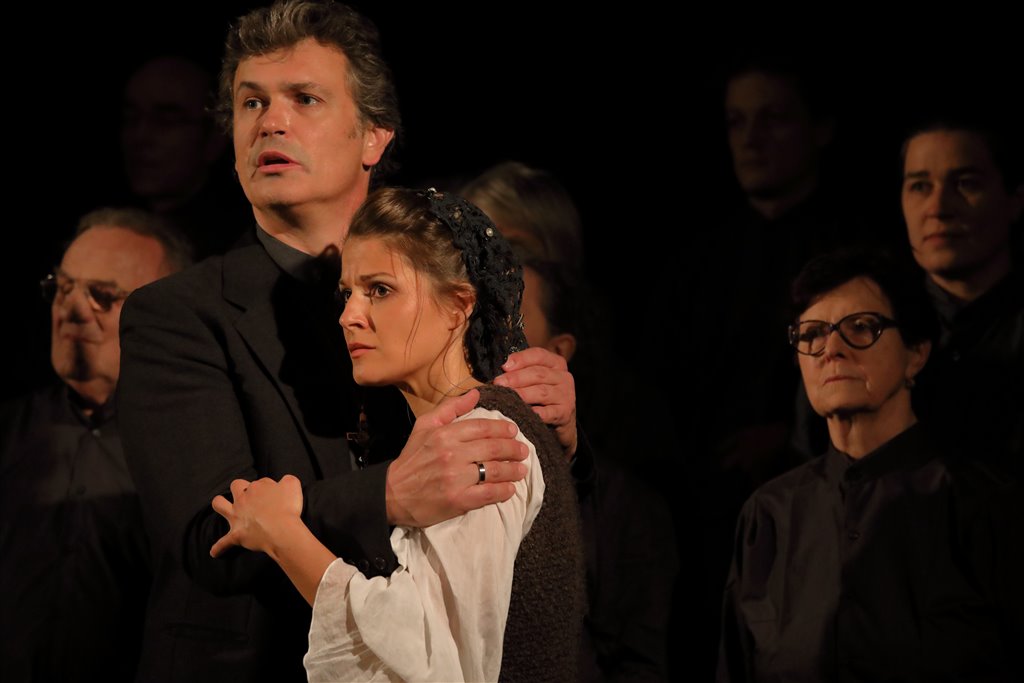
D: What advice do you have for someone who wants to sing in an opera chorus?
S: I think you have to really want it, not just do it because the working conditions are better or because your solo career didn’t work out. Otherwise you will always question whether it was the right decision. And if you prefer to be a soloist, it can also be frustrating if you “only” stand in the chorus and others are soloists in front.
You need the feeling that you belong in the chorus. For me, this was not quite so clear at the beginning, partly because of the prejudices mentioned, but I quickly realised that this is the right place for me. It’s also good if you are friendly and sociable, because we always work very closely and do a lot together, more than you would do in “normal” companies.
D: What does the future look like for opera? As a German, do you feel a responsibility for the German opera system?
S: That’s a very interesting question. I think that there will have to be changes, but not necessarily in the art, but in the external conditions. We need to get the younger generation in particular to be enthusiastic about opera and classical music and break down prejudices. However, I’m sure that classical music will continue to exist long after we’ve left.
We must ask ourselves why audiences tend to be older and what stops young people from going to the theatre. Of course, going to the theatre has a few restrictions: you have to sit still, you have to be there at a certain time, tickets cannot yet be bought via an app and some people think there is a dress code. All of these are factors. Maybe some also feel not educated enough and are afraid they won’t understand what’s going on. There’s also plenty of other things to do instead.
On the other hand, I also believe that the more digital life becomes for people, the more they will long for the real thing, for the live experience again. That’s why I think that opera is far from being out of date. For me, opera is the highest art form that exists because it unites so many different art forms.
You have music, divided into orchestra and singers, dance, lyrics, plot, stage design and costumes. There is no other art form that can offer this. That’s why I think it’s such a pity when people shut themselves off from it without having tried it. It really is a wonderful, magical world!
Thanks to Sonja for her insights into the German system and chorus-singing this week. You can learn more about her work at her website here. You can let us know your thoughts on the interview and any suggestions you may have for the future in the comments section below.
Notes and Links
- The Passaggio is a term used in classical singing to describe the transition area between the vocal registers. A major goal of classical voice training in classical styles is to maintain an even timbre throughout the passaggio.
- You can learn more about the Mozarteum and how to study there through their website here.
- The Salzburg Festival runs celebrates 100 years in 2020 and this year will be running in a shortened form due to Covid-19 restrictions. You can see what’s on at their website here.
- The Bayreuth Festival has unfortunately been completely suspended this year due to Covid-19. You can learn more about them at their website here.
